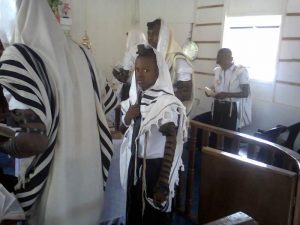 Almost all Nigerian Jews are part of the great Igbo (Ibo) people of southern and south-eastern Nigeria. They are one of the largest ethnic groups in Africa.
Almost all Nigerian Jews are part of the great Igbo (Ibo) people of southern and south-eastern Nigeria. They are one of the largest ethnic groups in Africa.
Some Igbo are also found in Cameroon and Equatorial Guinea, and there are Igbo émigrés outside Africa.
The Igbo number 32 million, with up to thirty thousand Jews among them, and with over 70 synagogues.
In rural Nigeria, Igbo people work mostly as craftsmen, traders, and farmers of yam, cassava, and taro. The Igbo are highly urbanized; the Jewish Igbo live especially in the city of Port Harcourt and the towns of Enugu, Aba, Owerri, Okigwe, and Abakaliki.
Many thousands of those Igbo who do not practice Judaism (as millions of Ethiopian Christians do) in recognition of possible Hebrew roots, and they identify with the Jews as underdogs.
Professor William Miles reports that:
“Igbo identification with and as Jews dates back to the 18th century, but concretized during and after the Nigerian Civil War (1967-1970), in which at least one million Igbo died in the failed bid for Biafran independence… The civil war and its disastrous consequences initiated a still-ongoing period of intense questioning among the Igbo concerning their history, present predicaments, and future prospects.”
Jewish Religious Practices
Igbo Jews circumcise boys at eight days, observe kashrut, separate menstruating women from men, and wear tallit and kippah. They celebrate Torah holidays, such as Rosh Hashanah and Yom Kippur. In recent years, they have begun to celebrate the less ancient holidays, such as Hanukkah and Purim.
Origins
Jewish Igbos have claimed descent from various lost tribes of Israel, but there are other possible sources as well, such as the following:
o Yemenite/Ethiopian Jews: based on their observance of only the holidays mentioned in Torah, perhaps the Nigerian Jewish community dates back to the time, possibly 2,600 – 2,900 years ago, that the Yemenite Jews crossed over the narrows of the Red Sea to Ethiopia. Most of those Yemenite/Ethiopian Israelites remained in Ethiopia, but some may have gone west, through the Bilad al-Sudan (see below), where many Jews lived, and on to Nigeria, before the time of the Talmud and its post-Torah holidays.
o The African-Jewish communities of the Bilad al-Sudan ( בִּלַדּ אַל סוּדָּאַן, West African Jews of what is now Ghana, Mali, and the Songhai Empire, which existed from the sixth to the nineteenth centuries, for hundreds of miles on both sides of the Niger river, where many Jews lived, and where local Mali legends record the first Jewish presence in West Africa).
o The Berber Jews of southern Morocco and southern Algeria (such as the group called Iddao Ishaak [Isaac]), who traveled south both to trade and to escape Islamic invasions of North Africa in the seventh and eighth centuries C.E.).
o The Spanish and Portuguese Jews (fleeing persecution by the Catholic armies that completed their reconquest of Spain and Portugal in 1492-1493).
o The Moroccan and Algerian Sephardic traders, who themselves, or their ancestors, had come from Spain and Portugal, and who had a fairly direct sea route from the Mediterranean, east through the Strait of Gibraltar, and south along Africa’s Atlantic coast, to Ghana, a populous trading center.
o The relatively nearby Jewish community of Ghana.
The most famous Nigerian is Chinua Achebe (1930 – 2013) an Igbo-Jewish novelist, poet, professor, and critic. His first novel “Things Fall Apart” (1958) is the most widely read book in modern African literature.
Some Nigerian Jewish communities have been receiving help from individual Israelis and American Jews who work in Nigeria with organizations like Kulanu, that reach out to remote Jewish communities.
*William Miles, “Jews of Nigeria: An Afro-Judaic Odyssey,” 2013,
